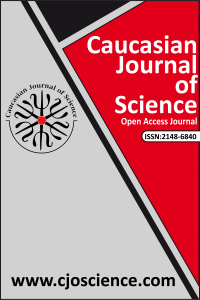İSTASYON TEKNİĞİNİN FEN VE TEKNOLOJİ DERSİNİN AKADEMİK BAŞARISINA ETKİSİ
İSTASYON TEKNİĞİNİN FEN VE TEKNOLOJİ DERSİNİN AKADEMİK BAŞARISINA ETKİSİ
The object of this study is to explain how the station technique raises
the studets' level of success in grade 7 in primary education, and to explain
the feeling which it arouses on these students. The practices were applied in
Melahat Akkutlu Secondary Schooling Kadikoy in Istanbul in the first term of
2013-2014 School Year in grade 7.
In the study, ''pretests and post tests control group model'' from
experimental designs was used. The experimental group (consists of 25) was
chosen as the group control-1 by chance. In the implementation process, while
the control group was instructed in the direction of the activities in the
curriculum (constructivism), the students in the experimental group were
instructed with the help of the technique of "the learning in the
stations". Experimental group was split to six equal station groups
composed of 4-5 students. Under the guidance of teachers, these groups studied
four lessons in a week one of which was regulated as 20-25 minutes. In the
study, the descriptive statistical methods (numbers, percentage, average,
standard deviation) were used while the outcomes were evaluated. On the other
hand, in the evaluation of the quantitative outcomes, the difference between
two groups, t-test and the one-way covariance analyse (ANCOVA) were used. The
whole outcomes were evaluated in 95 per cent confidence interval and in 5
percent meaningfulness level. At the end of the implementation, it was observed
that the level of the experimentation group - which was instructed with the
help of the station technique- increased by the analyse of the outcomes of the
academic achievement test.
___
- Balım, A.G. ve Erdem Özaçık, M. (2006) Çoklu Zekâ Kuramı Tabanlı Fen Öğretiminde Asit Baz Konusu Etkinlik Örnekleri, Milli Eğitim, 170, 67-82.
- Timur B., İmer N. (2012). “Fen ve Teknoloji Öğretmenlerinin Derste Kullandıkları Öğretim Yöntem ve Tekniklerinin İncelenmesi”. X. Ulusal Fen Bilimleri ve Matematik Eğitimi Kongresi. Bildiri.
- Cansaran, A., İdil, Ö., Kalkan, M., ( 2006). Fen Bilgisi Eğitimi Anabilim Dallarındaki “Okul Deneyimi” Uygulamalarının Değerlendirilmesi. GÜ, Gazi Eğitim Fakültesi Dergisi, Cilt 26, Sayı 1 (2006) 83-99 "Fakülte-Okul İşbirliği" Fen ve Teknoloji Ders programı (Temmuz 2004), MEB, Ankara
- Uysal, A. (2010). “Sınıf Öğretmenlerinin 2009 Hayat Bilgisi Öğretim Programında Belirtilen Strateji, Yöntem ve Teknikleri Uygulamadaki Yeterlik Düzeylerinin Belirlenmesi”. Yüksek Lisans Tezi, Ankara Üniversitesi, Ankara
- Manuel, B. (1974). How to Build a Learning Station: Everything a Teacher Should Know. Chelmsford, Massachusetts: Merrimack Education Center. (ED 088442).
- Hesapçıoğlu, M., (2008). Öğretim İlke ve Yöntemleri. Ankara: Nobel Yayın Dağıtım.
- Kaplan, S. (1999), A Learning Center Approach to Independent Study "Teaching For High Potential", Vol.1 No.1, April 1999. National Association For Gifted Children
- Milner, J.O.ve Milner L.F.M. .(2004).Bridging English. 3rd Ed. Upper Saddle River, Nj: Pearson Education,
- Morgil, İ., Yılmaz, A., Yörük, N. (2002). Fen Eğitimde İstasyonlarla İlgili Bir Uygulama.http://www. fedu. metu. edu. tr/ufbmek-5/özetler/d082. pdf
- Demirörs, F. Lise 1.Sınıf Öğrencileri İçin Ohm Yasası Konusunda Öğrenme İstasyonlarının Geliştirilmesi ve Uygulanması”, Yayımlanmamış Yüksek Lisans Tezi, Hacettepe Üniversitesi, Ankara (2007)
- Demir, M.R. “İstasyonlarda Öğrenme Modelinin Hayat Bilgisi Dersindeki Üst Düzey Beceriler Üzerine Etkisi” Yüksek Lisans Tezi. Hacettepe Üniversitesi, Ankara (2008)
- Benek İ. (2012). İstasyonlarda Öğrenme Tekniğinin İlköğretim 7. Sınıf Öğrencilerinin Fen ve Teknoloji Dersindeki Başarılarına Etkisiusu Etkinlik Örnekleri, Milli Eğitim, 170, 67-82.
- Furutani, S. S. (2007). How Does One Successfully İmplement Learning Centers at the Third Grade Level. Ma Thesis. Pacific Lutheran University.
- Maden, E. ve Durukan, S. (2010). İstasyon Tekniğinin Yaratıcı Yazma Becerisi Kazandırmaya ve Derse Karşı Tutuma Etkisi. 18 Ağustos 2011,
- Güneş, E., (2009) Fen ve Teknoloji Dersinde İstasyon Tekniği ile Yapılan Öğretimin Erişiye ve Kalıcılığa Etkisi. (Yüksek Lisans Tezi). Hacettepe Üniversitesi, Ankara
- Yayın Aralığı: Yılda 2 Sayı
- Başlangıç: 2014
- Yayıncı: Kafkas Üniversitesi
Sayıdaki Diğer Makaleler
ÖĞRETMEN ADAYLARININ TEKNOLOJİ KULLANIMINA YATKINLIK DÜZEYLERİNİN İNCELENMESİ
Tolga SAKA, Muzaffer ALKAN, Volkan GÖKSU, Önder ALBAYRAK, Selcan SUNGUR ALHAN, Nur AKCANCA
Arzu ÖNEL, Zeynep YÜCE, Dilek YEŞİLYURT
Abdurrahman GÜRBÜZ, Perihan AKBAŞ
KARS İLİ İLKÖĞRETİM OKULU ÖĞRENCİLERİNİN BESLENME ALIŞKANLIKLARININ DEĞERLENDİRİLMESİ
Arzu ÖNEL, Hicran ALKAN, Muzaffer ALKAN, Nur AKCANCA, Selcan SUNGUR ALHAN, Tolga SAKA
Aysel GÜVEN, Abamüslüm GÜVEN, Barış ÖZTÜRK, İnan KAYA, Hacı Ahmet DEVECİ
İSTASYON TEKNİĞİNİN FEN VE TEKNOLOJİ DERSİNİN AKADEMİK BAŞARISINA ETKİSİ
GLİKOPROTEİNLERİN YAPISAL ÖZELLİKLERİ VE FETAL FİBRONEKTİNLER
